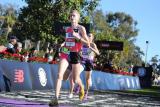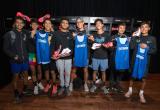Folders |
The Maine Contender: James Olivier's Journey To the USATF U-20 TeamPublished by
The Maine Contender Last summer, James Olivier was a 2:05 half-miler. One year later he’s a national 800 champion competing for Team USA at the Pan American U-20 Championships. By Dave Devine for DyeStat _______________ It started with a thoughtful anniversary gift. In mid-June, James Olivier and his girlfriend, Kaylee Porter, were celebrating two years of dating, and one of the presents James unwrapped was a white New Balance running hat. For the formerly reluctant runner, now increasingly committed to the sport as a rising sophomore for the University of Maine, it seemed a practical gift. Lightweight. Stylish. Matching the New Balance gear the Black Bears already wore in competition. It would certainly come in handy on the sunbaked roads as he banked summer mileage ahead of the 2019 cross country season. But as soon as Olivier spotted the white cap, his mind went in a different direction. With the USA Track and Field U-20 Championships less than a week away, and an 800-meter prelim looming for the Maine star, Olivier had been scrolling through Twitter that morning when he noticed a #MondayMotivation post from the official Olympics page highlighting Dave Wottle’s iconic push to 800 gold at the 1972 Olympic Games.
Never one to pass on a good running video, Olivier re-watched a race he’d viewed a surprising number of times for a kid who grew up in the 2000s. He found himself observing, again, how the U.S. Olympian slipped to dead last on the initial lap, easily distinguished by his trademark white golf cap as his gap. And then thrilling — again — as “Wottle the Throttle” swung wide on the final turn and rolled the field in the final 100 meters to claim an unlikely Olympic title. Monday motivation, indeed. “I watched it,” Olivier recalls, “and I thought, ‘I’m gonna need that speed if I’m going to perform at the U20’s. I’m going to need that energy he had in the second lap.’ Something to inspire me and give me that extra push.” Hours later, exchanging gifts with Kaylee (who also runs for the Black Bears), Olivier had the perfect complement to the grainy Olympic footage he’d watched in the morning. “It was just the weirdest coincidence,” he says. “I was like, ‘Okay, this is a sign. I need to wear this hat and I need to race like Wottle.’ Because that is definitely one of my favorite Olympic races of all time.” The following Sunday in Miramar, Fla., after a 1:52.21 800 prelim that saw Olivier advance as the fourth fastest qualifier, he toed the line for the USATF final in 95-degree heat, distinctive white ballcap perched on his head. Moments before the starter called the runners to set, Olivier removed the hat and summoned, one more time, that vision of Wottle’s Olympic effort. “I looked at it and thought, ‘Okay, I’ve just got to do this.’” Then he tugged the cap back on, brim low over his eyes, and prepared to race.
It felt like a stupid way for soccer to end. Not on some soaring header or acrobatic bicycle kick. Not on a flashy play that at least led to a decisive goal or a penalty kick. Not even in a game. After a promising high school career, after all his aspirations to play collegiately, after the hopes to follow his mom as the family’s next soccer star, James Olivier’s senior soccer campaign — his entire pursuit of the sport — ended at practice. Nothing dramatic, nothing epic. He fell backwards and shattered his wrist. “Honestly,” he says, “It was the lamest way it could’ve happened.” He spent much of his senior year in a cast, vacillating between the possibility of surgical repair and the option of allowing the fracture to heal on its own. When indoor track rolled around — a sport he took semi-seriously, scoring points where he could, mostly there to hang out with friends — he lugged the cast around the track during interval workouts. Muscled it through races. Felt the growing frustration as his autumn injury extended past winter and uprooted his final year of high school. “At that point,” he says, “I was sick and tired of everything that had to do with soccer, and that had been the most important part of my life until then…I threw it out the window, because I thought, ‘I can’t get hurt like this again.’” But even as his thoughts shifted from soccer to track, Olivier remained, by his own estimation, a mediocre runner. His list of high school PRs reads like a thousand kids in a thousand towns in America: a smattering of unrelated events — 200, 400, hurdles, high jump, the odd 800, 1600 on a whim — decent times and marks, solid relay splits when it really mattered, like the Class B outdoor state meet, where he and his buddies snagged a 4x800 title for Cony High. But if Olivier was hoping to attract attention from college coaches, there wasn’t much to recommend him. As the indoor season wound down, a 51-second 400 PR was probably the best thing he had going. Maybe the only thing. “I never focused on the 800,” Olivier says. “I never focused on track in general, so I never really trained. It was something I did to stay in shape for soccer; it wasn’t that important for me.” Nonetheless, he sought out University of Maine head coach Mark Lech at the 2018 Class B indoor state meet and inquired about walking on the team. He informed the longtime Maine mentor about his 400 speed, mentioned his 2:05 personal best in the 800, and — somewhat sheepishly — shared his enthusiasm at recently cracking 5 minutes in the mile for the first time. He had no idea if any of this added up to a walk-on invitation from a Division 1 coach. “Nothing was impressive about me at that point.” But Lech, who has been coaching at Maine for 20 years, saw something in the earnest Augusta runner that he’s grown adept at spotting over the years. Promise. Knowing he couldn’t recruit Olivier as a sprinter or a hurdler, Lech honed in on his belief that everything in track and field is predicated on leg speed, that runners continue to move up in distance until available leg speed matches ideal race length. “Fifty-one (for 400 meters) is good speed,” Lech says, “and I knew he was undertrained. Those are the types of people I get at Maine, I get the diamonds in the rough. But those are the kinds of people I like to work with.” Years earlier, the Maine coach had made his own transition from promising high school quarter-miler — “I say ‘quarter miler,’ because that shows you how far back I go,” — to 800-meter star in college, eventually working down to 1:46.2 as a post-collegian. He observed similar potential in the lanky, 6-foot, 5-inch sprinter/hurdler standing in front of him at the indoor state meet. Lech told Olivier there might be a place for him on the Maine roster — a non-scholarship, walk-on slot — if he assented to a pair conditions: move up in distance, and run cross country. “When he told me ‘cross country,’” Olivier recalls, “I’m not gonna lie, it took a second. The farthest I had ever run before that was like, three or four miles. But I was like, ‘Well, if this is what has to happen, it has to happen.’” Shortly after high school graduation, Olivier received his summer training schedule for the 2018 cross country season. He stifled a laugh, took a deep breath, and set to work. “Honestly,” he says, “I looked at the workout sheet, and I was like, ‘This is going to be one of the hardest things I’ve ever done.’”
The summer mileage paid off. Gradually ramping up the weekly distance to once improbable levels — “Ludicrous,” Olivier says — he eventually reached 50 to 60 miles per week during a fall season that culminated in an 8-kilometer best of 26:33 at the America East conference championship, a race in which he crossed as Maine’s fourth man. Nothing earth-shattering, but from Lech’s perspective, the point was never to race fast in the fall. “I didn’t care how he ran in cross country,” the coach says, “it was more about getting ready for track season. He took to distance running really well for someone who hadn’t been doing much distance — ever. That showed me quite a bit of talent.” As the days shortened and the Black Bears headed undercover, Olivier began to show his new coach that they might only be scratching the surface. In one memorable workout, Olivier managed 20x400 and 18x200, all churned out near 64-second pace. “That,” he says, “was ridiculous.” Another time, early in the winter, he was given a pair of 400-meter repeats; the first was slated for 50 seconds, the closer at 52. “At that point, my 400 PR was only 51,” he laughs, “so being told to run 50 in a workout, followed by 52 — I ended up breaking my own PR in a workout.” As the indoor schedule started to unfurl, coach and athlete sat down to discuss goals for the season. Specifically, Olivier was interested in what he might need to accomplish in order to earn a scholarship. Lech was again characteristically frank. In order to move from walk-on to scholarship athlete, the eager frosh would need to place at the conference meet and run at least 1:52 in the 800. At the time, Olivier’s personal best still hovered near 2:05. “It just seemed like such a distant, foreign idea for me,” he says of that conversation. But once the season began, Olivier started laddering down his 800 marks in remarkable fashion: a 1:57 opener in December (for his first sub-2), then 1:55 and 1:54 in January, 1:53 to 1:52 in February, and finally, in March, a 1:50.16 in the prelims of the IC4A/ECAC indoor championship. A week earlier at the America East meet, he’d run 1:52.44 to place fourth and make all-conference. Run 1:52? Check. Place at the conference meet? Check. Both challenges met, although even Olivier was stunned by the dizzying progression. “I was like, ‘Where is this coming from?’ But I kept focusing on winning the races or placing high, and the times kept dropping.” Outdoors, hampered by a bone bruise that first flared up at that IC4A indoor meet, Olivier battled through a more modest campaign, but still managed to consistently churn out races in the 1:52 to 1:53 range. After failing to make the America East 800 final by a mere .003, and following that disappointment with a subpar outing at the New England championship, it might have been a good time to tuck away the spikes and focus to his sophomore year, but Olivier and Lech had their eyes on one more race, more than a month away. His 1:50.16 from indoors had qualified Olivier for the USATF U-20 Championship in June. “From the workouts,” Lech says, “I knew there was a potential to still run fast. From there, it was a question of how much he wanted it.” Olivier spent a month allowing the bone bruise to recover and sharpening for two rounds in Miramar. After a smooth auto-qualifier in the prelim, Olivier executed the final to perfection. At the 350-meter mark he made a push on the outside to put himself in contention at the bell, and then hung near the front for the duration of the closing lap. When the pack curved through the final turn, the white-capped Olivier — as easy to spot as Wottle in those long ago Olympic Games — delivered a gear his competitors couldn’t answer and powered home in 1:50.67. Crossing the line, he threw his hands in the air, face caught in an expression between astonishment and joy. “It didn’t fully set in until a while after the race that I had just won a national title,” he says. “There was like, no progression — it just kind of dropped in a bucket: Here’s your national title. I didn’t even have the context I needed to fully understand what that meant.” The USATF victory also earned Olivier a berth on Team USA for the Pan American U-20 Games to be held July 19-21 in San Jose, Costa Rica. When he received his national team gear for the trip, that moment, too, seemed surreal. “It was amazing,” he says. “I’m still buzzing about it.”
A few months ago, if you had Googled James Olivier’s name, most of the results would have been local news items and a smattering of New England race results. There’s a short article from the website of 92 Moose FM, “Central Maine’s #1 Hit Music Station.” A few pieces from the University of Maine Athletics site. A story about his victory in the 2018 Gasping Gobbler 5k, a Thanksgiving race for which the temperature at start time was 7 degrees and the winner received a turkey, a pie and a package of dinner rolls. Little to suggest the possibility of a national track title or an international appearance in a Team USA singlet. Olivier knows this. With a self-deprecating laugh and an allusion that betrays his track fandom, he acknowledges how underexposed he is in the running world. “I’m no Matt Boling, but — ” The unplanned trip to Costa Rica has meant rearranging summer plans, including requesting time off from the Thai restaurant where he washes dishes and performs food prep. Although the plan had been to take a short break after the USATF meet and then begin increasing the mileage for sophomore cross country, he and Lech are now extending a season that once seemed destined to end in May. “Physiologically,” Lech says, “I think he’s got something left in the tank. It’s just keeping his mind sharp and ready to go to the next point.” Both hope there might be a sub-1:50 in the cards for Pan Ams, but Olivier is comfortable waiting for the 2020 indoor season if that’s how things unfold. He also has his sights set on a loftier goal for the upcoming undercover campaign. He’d like to attempt a sub 4-minute mile. “Obviously, I want to keep running the 800,” he says, “but I think I’ll really be able to shine in the mile once I dig my teeth into that.” His personal best from high school was just 4:47, but he points out that he barely ran the event at Cony High. His two collegiate attempts yielded successive bests of 4:31 and 4:18, both indoors. If that still sounds like a far cry from sub-4, you have only to look at his 800 progression. “He’s become a real student of his sport,” Lech says. “He knew what he was doing with the Dave Wottle connection. He knows where he’s trying to go.” For now, though, Olivier is just happy to be in this moment, enjoying his unexpected success. “It’s crazy that I’m here,” he says. “Hopefully there’s more to come.” More news |
















